Pakistan’s power sector has seen a notable decline in circular debt, reaching Rs. 1.66 trillion in July 2025. This marks a 29.3% decrease from Rs. 2.35 trillion in the same month last year, according to Arif Habib Limited (AHL).
The largest portion of the debt remains linked to power producers, amounting to Rs. 908 billion. While this is a 5.5% rise from June, it is a 41.8% drop compared to Rs. 1.56 trillion in July 2024.
Government-owned generation companies (GENCOs) reported payables to fuel suppliers of Rs. 93 billion. This figure shows a 13.1% reduction from last year, reflecting improved management within the sector.
Debt under Power Holding Limited (PHL) remained steady at Rs. 660 billion from June, slightly lower by 3.4% compared to last year. These figures indicate consistent efforts to manage liabilities within the power sector.
The report also highlighted other contributors to circular debt. Unreleased budgeted subsidies added Rs. 35 billion in July, up from Rs. 28 billion in June. Distribution company (DISCO) losses contributed Rs. 41 billion, and under-recoveries accounted for Rs. 46 billion. However, prior-year recoveries and adjustments reduced the total burden by Rs. 72 billion.
Generation cost adjustments, including quarterly tariff and fuel charges, further reduced the debt by Rs. 6 billion during the month. Non-payment from K-Electric was recorded at Rs. 3 billion.
Overall, the net monthly addition to Pakistan’s circular debt stood at Rs. 47 billion in July. Analysts suggest that while challenges remain, the significant decline reflects positive reforms and better financial management in the power sector.
The continued focus on addressing inefficiencies and improving collections is expected to further stabilize the power sector and reduce future circular debt accumulation.
This development marks a key milestone for Pakistan’s energy sector, highlighting the government’s efforts to strengthen financial discipline and ensure sustainability.
In other related news also read Power Sector Anticipates Forthcoming Policy Reforms











